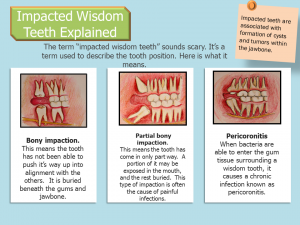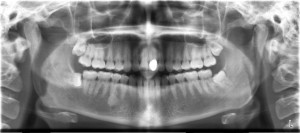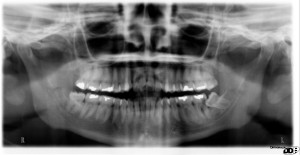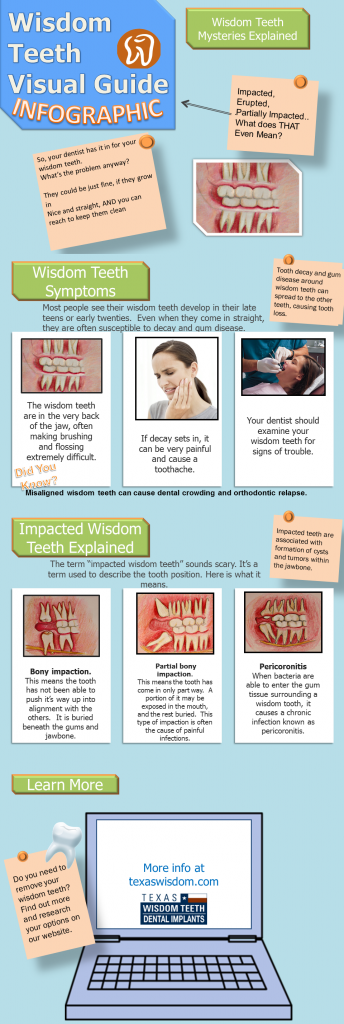 Third molars, informally referred to as wisdom teeth, are the last set of teeth to erupt from the jawline. An evolutionary hangover from a time when coarse foods and poor hygiene resulted in extensive tooth loss for people by their late teens and early twenties, modern diets and hygiene routines mean patients typically keep their healthy, natural teeth well past their early twenties making a third set of molars unnecessary. Approximately 85% of people need to have their wisdom teeth extracted, and it is the most common type of oral surgery performed in most dental offices. Patients have wisdom teeth removed due to crowding that may cause other teeth to shift, and impaction, the inability of a tooth to erupt from the gum line. While this procedure typically presents minimal risk for patients, there are a few potential oral health concerns directly related to wisdom tooth extraction, and knowing the warning signs and symptoms of each is the best way to ensure your recovery period is quick and comfortable.
Third molars, informally referred to as wisdom teeth, are the last set of teeth to erupt from the jawline. An evolutionary hangover from a time when coarse foods and poor hygiene resulted in extensive tooth loss for people by their late teens and early twenties, modern diets and hygiene routines mean patients typically keep their healthy, natural teeth well past their early twenties making a third set of molars unnecessary. Approximately 85% of people need to have their wisdom teeth extracted, and it is the most common type of oral surgery performed in most dental offices. Patients have wisdom teeth removed due to crowding that may cause other teeth to shift, and impaction, the inability of a tooth to erupt from the gum line. While this procedure typically presents minimal risk for patients, there are a few potential oral health concerns directly related to wisdom tooth extraction, and knowing the warning signs and symptoms of each is the best way to ensure your recovery period is quick and comfortable.
(more…)
January 7, 2016
Possible Complications after Wisdom Teeth Removal
February 21, 2014
Wisdom Teeth Removal During Spring Break
Everybody loves Spring Break! A week long reprieve from classes, exams, and studying intended to allow us to indulge the Spring Fever that inevitably infects us as soon as the weather starts to improve and the days become a little longer. You might think of wisdom teeth when you think of Spring Break, but at Texas Wisdom Teeth and Dental Implants, we do! That is because Spring Break poses the perfect opportunity for our patients who are also dedicated students to take care of their dental health, have their wisdom teeth removed, and never miss a beat when it comes to academics.

Impacted and erupted wisdom teeth
During the month of March, we are scheduling patients for wisdom teeth extraction with convenient flexibility. Our office location in North Dallas makes it easy to get to us. Most primary and secondary schools have Spring Break scheduled the week of March 10-14 this year and appointments are filling fast. If your dentist or orthodontist has recommended that your wisdom teeth be removed, give us a call today and reserve your appointment now.
Tips For Wisdom Teeth Removal
- Schedule a consultation appointment prior to surgery in order to meet with your oral surgeon, discuss your individual needs regarding wisdom teeth removal and plan for any assistance available through dental insurance. Then plan your surgery when it’s convenient for you.
- Impacted wisdom teeth might sound scary, but the truth is, most people’s wisdom teeth are impacted to some degree. It just means that the teeth are trapped beneath bone or gum tissue. Removing impacted teeth is not necessarily more uncomfortable afterwards than removing teeth which have erupted into the mouth. Plan on recovering at home the day of surgery, and for up to three days after surgery, although it is not always necessary to stay at home in bed during recovery. Most people are up and about, resuming normal activity within a day or two after surgery.
- If you play a horn, plan to take a break for a week or so. It is recommended that musicians avoid windwood instruments for up to a week following wisdom teeth removal. This is because sensitivity, mild swelling and healing surgical sites need a little time to heal. The same goes for aerobic exercise and weight lifting.
- Make a list of the questions you have about the need for wisdom teeth removal, the surgery, anesthesia and recovery. This way, you won’t forget anything important to you when you see your surgeon.
- If you grind or clench your teeth, make sure to tell your surgeon prior to surgery so he can help prevent muscle fatigue and facial muscles from becoming stiff and sore following surgery. In some cases, a special medication may be prescribed in order to help relax your facial muscles to prevent grinding and clenching during recovery from surgery.
- Follow the pre-operative and post-operative instructions provided to you in order to have a smooth and uneventful recovery from wisdom tooth removal. Keeping your mouth clean and maintaining a healthy diet are among the things that can help make your recovery painless
- Contact your surgeon if you have any questions, concerns or if you find that your discomfort level is increasing rather than decreasing. Increasing discomfort, especially after the third day post op can be a sign of a dry socket. A dry socket is a delay in the healing process in which the protective blood clot that forms in the surgical site is dissolved, leaving the tooth socket exposed and uncomfortable. Only about 15-20% of patients who have lower wisdom teeth removed experience a dry socket. The good news s, that at the first sign of one, a medicated dressing can be applied in order to keep you comfortable during healing. An office visit would be required in order to treat a dry socket, but it is well worth it. Prevention of dry socket depends mostly on avoiding smoking and keeping the surgical site clean, however, some patients are simply predisposed to this condition.
- RELAX! The best way to have a smooth experience with wisdom teeth extraction is to do your best to relax and avoid stressing out if you can. IV general anesthesia allows patients to sleep through the procedure peacefully, and wake up without pain once the surgery is over. Discomfort following surgery is usually easily manageable with an over the counter medication such as Advil or Aleve, or with a stronger prescription pain medication.
If it is time to have your wisdom teeth evaluated and removed, schedule a consultation appointment today and take advantage of our special offers available to new patients. Your consultation and panoramic x-ray is FREE, and most dental insurance plans cover the surgical procedure. Patients without insurance can take advantage of our cash payment pricing with an all-inclusive fee of $1185 for surgical removal of four wisdom teeth with IV general anesthesia.
June 10, 2013
Why Did My Orthodontist Recommend Wisdom Tooth Extraction This Summer?
Your teen has been in braces for three years, and it has truly been a labor of love to make sure they got to all their appointments on schedule. Your bank account likely reflects that the cost of raising a child is estimated at over $200,000 over a lifetime. Kids are expensive, and so is orthodontic treatment. Now, your child’s orthodontist has recommended that his wisdom teeth be removed this summer. Your teen’s wisdom teeth are not hurting him, so why the big rush to do surgery? This article is not meant to scare you or sensationalize the risks of avoiding wisdom teeth extraction.
Should some wisdom teeth be left alone? Absolutely! Should you ignore a recommendation for wisdom teeth surgery? Absolutely not! Here is why you should definitely have a consultation with an oral surgeon if your child’s orthodontist has recommended wisdom teeth removal.
Your Orthodontist Is Not Crazy, He’s Protecting Your Investment

Impacted wisdom teeth
I know, that title sounds like a pitch, but the fact is, there are numerous reasons that wisdom teeth might be recommended for extraction, even when there are no painful symptoms associated with them. Let’s take a minute to discuss some of the proactive indications for removal of wisdom teeth.
- Your orthodontist has a greater chance of success and ease of treatment moving the molar teeth when the wisdom teeth are not obstructing the path. When the wisdom teeth are impacted or partially erupted, they are often positioned right behind or under the second molars. These second molars cannot be moved easily or effectively with the wisdom teeth causing an obstruction.
- Once the braces are removed, the teeth are free to shift back into malposition. Removing the wisdom teeth helps prevent orthodontic relapse and dental crowding once the braces are removed. Incidentally, diligent use of the retainer all the way past age 25 is recommended for prevention of orthodontic relapse.
- Malpositioned wisdom teeth can cause damage to the adjacent teeth. Some of the damage that can be caused by malpositioned wisdom teeth includes tooth decay, gum disease and loss of bone around the second molars.
- Wisdom teeth can develop destructive pathology. Cysts, tumors and other pathology sometimes forms around an impacted wisdom tooth. Pathology such as this may be completely asymptomatic for a very long time. Once symptoms, pain, swelling develop, a cyst or tumor has usually already done damage to the jaw bone and/or teeth.
- Even erupted wisdom teeth are very hard to keep clean. Inadequate dental hygiene due to difficulty of access to the wisdom teeth can cause tooth decay and gum disease, putting other teeth at risk for damage and tooth loss.
What Happens If I Just Wait Until The Wisdom Teeth Cause Pain?
Your orthodontist is trained to identify the potential for future problems with the teeth as well as

Impacted tooth on lower has caused decay in adjacent tooth
diagnose and treat current problems. When your orthodontist recommends wisdom tooth extraction, it is typically for one of the reasons listed above. The only thing in it for the orthodontist is the satisfaction of a job well, done. He doesn’t earn any compensation for sending your child off to have their wisdom teeth removed, he honestly just wants to give you the best advice possible, and protect your investment of money, time and energy, which are all spent in straightening a teenager’s teeth. If you received a recommendation for wisdom teeth extraction, and decide to wait until symptoms develop, here are the risks you are taking:
- Wisdom teeth pain can be very uncomfortable. Your teen will probably develop the most severe symptoms in the middle of the night on a Saturday, if we buy into the whole “Murphy’s Law” philosophy. If this happens, you will either find yourself in the ER or frantically trying to get a last minute appointment first thing Monday morning.
- Dental crowding cannot be reversed by removing the wisdom teeth. If you wait for dental crowding or orthodontic relapse to occur, plan on starting the whole orthodontic treatment all over again- the teeth won’t shift back into position without braces.
- Tooth decay does not usually cause pain until the decay reaches the pulp of the tooth. Once this happens, repair of the tooth is usually extensive and costly, assuming the decay can be repaired in the first place. Second molars are important teeth- you definitely want your teen to keep them for a lifetime!
- Chronic infection is annoying, painful and can actually progress into a serious health concern. The same bacteria which cause gum disease cause chronic infection of the wisdom teeth. Some of these bacteria have been identified as a possible catalyst to systemic health conditions such as heart problems. At the least, chronic infection damages the gum tissue and results in loss of bone (which, by the way, holds the teeth in the jaw). In rare cases, chronic infection can settle in the bone itself, a condition called osteomyelitis, which can be very serious and require hospitalization.
- Cysts and tumors destroy precious jaw bone structure. If left untreated, benign cysts and tumors associated with impacted wisdom teeth will continue to grow and destroy any bone in its path. When there is extensive damage to the jaw bone, the jaw is at increased risk for pathological fracture. Teeth are often damaged and lost when a cyst or tumor is left untreated. Sometimes, pathology such as this becomes infected, further complicating the treatment required to resolve it.
This summer, if you received a referral from the orthodontist to have your teenager’s wisdom teeth extracted, don’t procrastinate. Find out how urgent the issue really is before you make a decision. Sometimes waiting is just fine- sometimes it is not. Go for a consultation with an oral surgeon, get facts and answers. Educate yourself on the pros and cons of wisdom teeth extraction, and make your decision based on what you learn. If this information is helpful to you, share it with a friend!
April 29, 2013
Impacted Wisdom Teeth- A Visual Guide

A Visual Guide To Impacted Wisdom Teeth
Impacted, Erupted, Partially Impacted- What does all that even mean? Your dentist has it in for your wisdom teeth, but at the moment they are not hurting you. Before you decide to wait to act upon your dentist’s advice to remove your wisdom teeth, make sure you know all the facts about impacted third molars.
Why Remove Wisdom Teeth?
When it comes to dental surgery, most people are of the attitude “If it ain’t broke, don’t fix it”. This is a really great rule of thumb as long as you recognize that pain is not the only indicator of wisdom teeth problems. In fact, there are many instances in which the third molars can be seriously dysfunctional and even destructive without experiencing pain. Like most dental conditions, such as tooth decay and gum disease, pain does not usually enter the picture until the disease or condition has become quite advanced. Your wisdom teeth are no different. It’s a good idea to have your dentist examine your third molars for signs of pathology, disease, decay or other problems. If he makes a recommendation to have the wisdom teeth removed, ask for an explanation about “why”, so you can understand if there are underlying problems that exist, but perhaps are not painful at the moment.
Impacted Wisdom Teeth
An impacted tooth is one which has not ‘erupted’ into the dental arch, in alignment with the other teeth. It is positioned within the jaw bone, covered completely or partially with bone and gum tissue. Just because a tooth is impacted does not mean it must be removed. Some wisdom teeth are positioned in such a way that removal can cause more risk for complications than leaving the tooth alone. Only an oral surgeon is best qualified to assess impacted wisdom teeth and make this determination.
Some signs of trouble with impacted teeth include:
- Malpositioned tooth which has the potential to cause harm to the adjacent teeth
- Improper tooth positioning which causes misalignment and crowding of the other teeth, especially after previous orthodontic therapy.
- A wisdom tooth which has erupted only partially creates a prime environment for bacteria, resulting in chronic infection, gum disease, decay and pain.
- Formation of destructive cysts around the wisdom tooth which can destroy jaw bone and cause loss of the adjacent teeth, infection or even pathologic jaw fracture
While the problems outlined in this graphic are not the only problems we see associated with impacted wisdom teeth, they are the most common. Some of these problems do not cause physical pain until they have become advanced. As with all dental problems, it’s usually less expensive, less traumatic and easier on you to take care of problems while they are still in their early stages. Ask your dentist about the health of your wisdom teeth, or visit our Dallas oral surgery practice to find out whether your wisdom teeth are healthy enough to keep.
Impacted Wisdom Teeth- A Visual Guide – An infographic by the team at Impacted Wisdom Teeth- A Visual Guide
Embed Impacted Wisdom Teeth- A Visual Guide on Your Site: Copy and Paste the Code Below
July 16, 2012
Wisdom Teeth Removal- A Rite of Passage?
 Wisdom teeth removal has become a rite of passage for American teenagers. Even the name “wisdom teeth” has connotations of the coming of age. Wisdom teeth, clinically known as third molars, have been bestowed this moniker based on the age at which they first begin to appear. The teenage years between ages 13 and 21, historically called the “Age of Wisdom”, is the period during which the third molars begin to erupt into the dental arch.
Wisdom teeth removal has become a rite of passage for American teenagers. Even the name “wisdom teeth” has connotations of the coming of age. Wisdom teeth, clinically known as third molars, have been bestowed this moniker based on the age at which they first begin to appear. The teenage years between ages 13 and 21, historically called the “Age of Wisdom”, is the period during which the third molars begin to erupt into the dental arch.
A dentist or oral surgeon may prescribe the removal of wisdom teeth and impacted wisdom teeth based on signs and symptoms of trouble. The human jaw typically cannot accommodate this third set of molars and as they attempt to grow into the small space, they become malpositioned and impacted. In the case that wisdom teeth come in normally, they are often positioned so far back in the jaw that they are difficult to keep clean. Erupted wisdom teeth which are situated very far back in the jaw are more susceptible to decay and gum disease. Gum disease around the third molars inevitably spreads to the second molars and sometimes even further forward. In the interest of preventive dentistry and to prevent serious problems with periodontal recession and gum disease, dentists often recommend the removal of erupted wisdom teeth.
Impacted wisdom teeth are routinely removed due to malposition of the teeth, damage or potential damage to the second molars, infection, cyst formation and other pathology often associated with impacted third molars. Orthodontists in particular often prescribe removal of the wisdom teeth in order to prevent orthodontic relapse due to the pressure of erupting wisdom teeth on the other teeth in the jaw.
Parents across the country scramble to the oral surgeon’s office as the end of summer draws nearer in order to have their  child’s wisdom teeth extracted before their retainers stop fitting. Motivated by the looming possibility of repeat orthodontic therapy, and the chronic infections often associated with wisdom teeth, parents schedule surgery for their child. The challenge is often in balancing the cost of wisdom teeth extraction with their teenager’s busy summer schedules and even busier school year schedules.
child’s wisdom teeth extracted before their retainers stop fitting. Motivated by the looming possibility of repeat orthodontic therapy, and the chronic infections often associated with wisdom teeth, parents schedule surgery for their child. The challenge is often in balancing the cost of wisdom teeth extraction with their teenager’s busy summer schedules and even busier school year schedules.
Somewhere between vacation, band camp, football practice and cheer clinics lies just few days of Redbox rentals, ice cream and X-Box that every teenager dreads. The stories and warnings from friends are fanciful and exaggerated, working each other up into a tizzy over this, the first surgery of many of their lives. Truthfully, more than 90% of them will come through with flying colors, easily transitioning back into their normal routine within a few days. While complications are unusual, about 10% may experience prolonged discomfort, swelling, mild bruising or even the dreaded dry socket. Symptoms of all of these, of course, are easily relieved in the office with a post- operative visit with the oral surgeon.
The poor, unappreciated parents have the toughest role in wisdom teeth removal. Consider the orchestration of events that a parent must pull off in order to indulge their child in this bittersweet rite of passage. Schedules and activities must be coordinated. If soccer practice is to be missed, then a signed, certified and notarized letter from the surgeon and the U.S. Surgeon General is often required in order to excuse the recovering patient from physical exertion during recovery. Other children in the household must be taken into consideration, as extracurricular activities do not stop for brother’s oral surgery. Special food must be purchased and prepared, and a day or two of work will often be missed.
Then there is the expense. Surgery of any kind is expensive. Most families have health insurance, but fewer and fewer have dental insurance these days. The families who do have dental insurance have seen their out of pocket expenses increase in recent years. How does a family without dental insurance save money on the extraction of wisdom teeth? There are a variety of ways to accomplish this, but I would like to tell you about our solution in particular.
Dr. Robert A. Weinstein, a Dallas oral surgeon, has devised a plan to help alleviate this burden for parents. He is an “in-network” provider for most PPO dental plans. As such, patients often pay only about 20% of the total cost of surgery.
No insurance? A flat rate special fee for surgery and anesthesia may be the answer for you. Depending on your diagnosis, going the cash payment route with this option can save you about 50% of the cost of full fee oral surgery. Dr. Weinstein has decided not to charge people more when they do not have insurance. Instead, he analyzed the “in network” fees from the top PPO plans fee schedules, and created a lower flat fee for the uninsured based on the “in network” fees associated with popular dental plans. The only catch? Services are paid for when rendered. The benefits? No surprises regarding fees or coverage. There are no claims to file and no bills coming in 3 months because insurance didn’t pay a portion of the bill. See our listing on Dallas Dental Implants and Wisdom Teeth for more information.
As summer winds down to a close and that busy school year inches closer with every degree the temperature rises, there is one thing that parents can do to make it all easier to deal with. Schedule the summer wisdom teeth removal now and take advantage of the summer special on flat fee wisdom teeth removal. (Includes post-operative ice cream and a sports/band/cheer excuse letter).
Have a wonderful summer!


